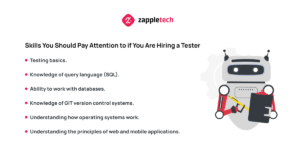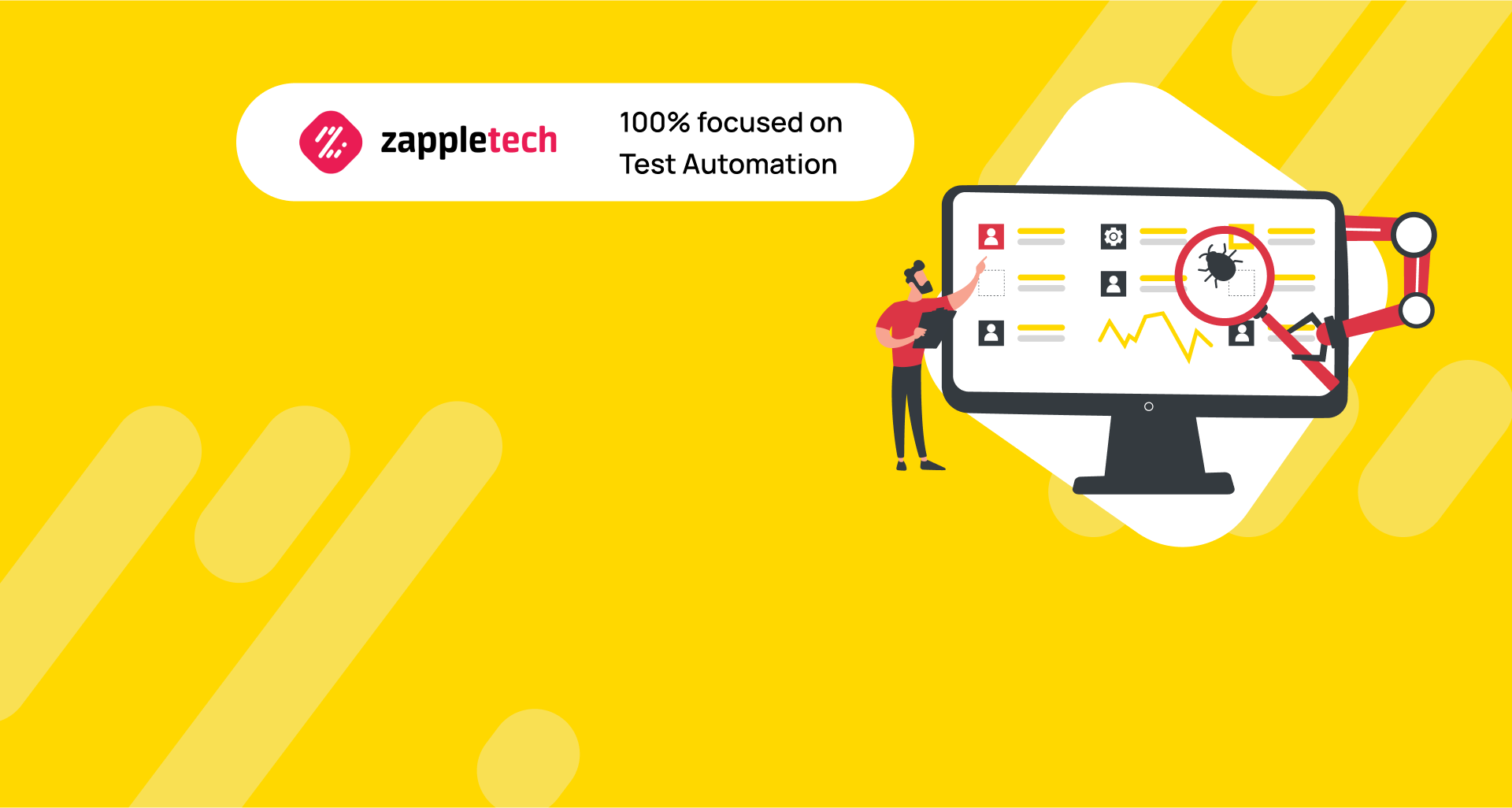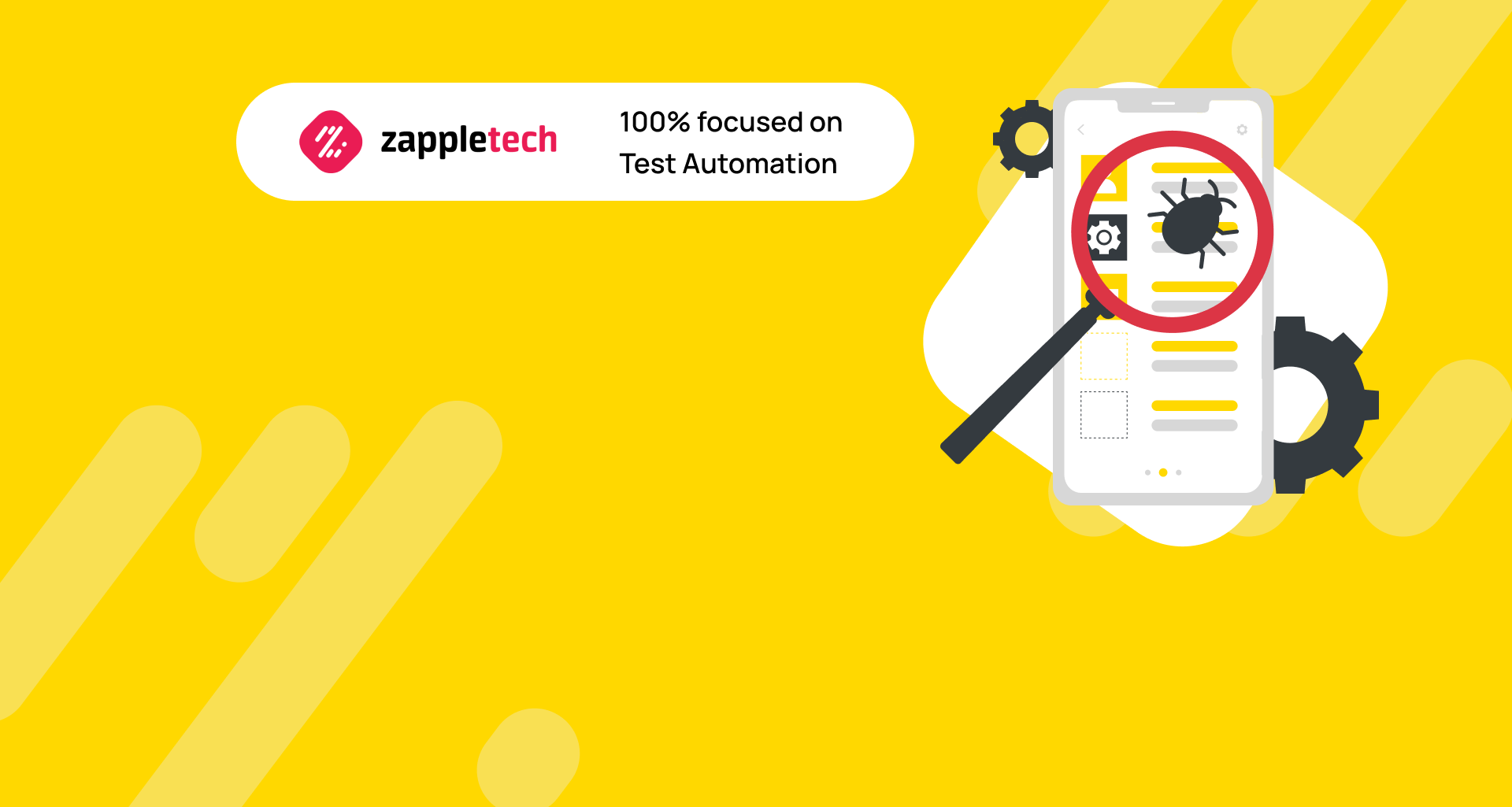The IT industry has created opportunities for the emergence of many professions. One of them is a QA tester or engineer. Some employers may wonder: why should I even hire QA tester or test engineers, at all? Is hiring a good developer who will simply avoid mistakes not enough? But in fact, almost any company will try to hire a tester and there are a number of good reasons for this.
The thing is that not only the IT product serviceability but also the company’s reputation depends on a good tester. After all, you probably don’t want to deal with a program or application that has dozens of reviews about software bugs.
Table of Contents
Who Is QA Engineer?
This is a specialist who ensures IT product quality (QA stands for Quality Assurance.) His main functions are:
To verify the software working as intended, according to the documentation, and matching the expectation.
To find a bug or an error in the product before the user does it after the release.
For this, he puts himself in the user’s place and tests the new project’s functionality.
When the tester already found the bug, he submits a bug report to the developers to fix it. When the testing process is completed and QA is sure that it is already done and the task is completed, he passes it on to the product manager.
In some essence, the software QA testers and tester is the first program user. So he, as a user, must test all the program functionality and think through all the options for user interaction with this program.
That’s why there is a joke among IT people that the programmer thinks about how to fix something, and the tester thinks: about how to break it. And actually, this is why software developers jokingly “dislike” testers, because they always come up with a new job for them.
That is, what we know about this work:
A QA tester is an IT specialist, who determines the end product quality, which affects in the end, the company’s image.
QA engineer tests the company’s IT product (website, application, program, game).
Such a specialist creates bug reports for developers to fix these bugs.
Quality Assurance is a process that includes a set of activities that is carried out throughout the development, test data release, and operation cycle.
The purpose of such a process is to test engineers to build a system that will reduce the number of defects while preventive methods.
Simply put, a QA engineer finds bugs before the user finds them. At least this is the such employee’s direct.
What Kind of Testers Do Companies Hire
Let’s look at testers’ types by their skills, responsibilities, and duties. The fact is that performing the task to hire a full QA testing engineer depends on his functions, experience, and gained skills. Conventionally, such a specialty can be divided into three levels:
- Testing. Testers are specialized professionals responsible for meticulously examining programs to uncover defects. They focus primarily on this task, using their expertise in programming languages to simulate real-world scenarios. Their findings are documented in detailed reports, providing developers with essential feedback for improvement. This close collaboration between testers and developers ensures a smooth development process, resulting in high-quality software products.
- QC (Quality Control). QC engineers are experts tasked with testing programs in both the development and testing phases. They focus specifically on applications and websites, meticulously examining every aspect to ensure they meet rigorous quality standards. Their findings are documented and serve as valuable feedback for developers, facilitating the refinement of the product. This collaboration between QC engineers and developers ensures a high-quality end result.
- QA (Quality Assurance). QA specialists are essential professionals in the software development process. They are responsible for ensuring product quality at every stage, employing rigorous procedures. Their primary objective is to guarantee the quality of software products or services provided to customers by an organization. This involves meticulous testing and adherence to established quality standards. QA specialists work closely with the development team, contributing significantly to the overall reliability and success of the final product.
So, QA includes all the functions that the tester and QC perform.
QA (software testing) is the process of checking the quality of a product and all of its processes in order to ultimately satisfy the needs of the client.
But this is not the main classification of software testers here. The fact is that the software tester here can also be manual and automatic oned. And if the manual tester’s task is to simulate user actions, then, of course, you have to do everything manually.
In turn, an automated tester (AQA) can write a program that mimics the user’s actions. To do this, testers learn a programming language such as Python or JavaScript.
Testers work with different IT and software product and types and can also be divided according to this criterion. So, the company can hire a tester that works with:
- Web applications.
- Mobile applications.
- Games.
- Software.
At the same time, compatibility testing is carried out according to various parameters: Security, Performance, Usability, etc. And it’s also taken into account when you search for such a specialist.
Why Do Companies Hire Testers?
Any user and developer will say that a bug is at least unpleasant. And as a maximum, it can reduce the profit from the product and damage the company’s reputation. Sometimes even a poorly designed and delivered “Buy” button can decrease the level of sales by several times. Bugs and errors are an inevitable part of development, and they can happen for a variety of reasons:
- Lack of time for full development.
- Human factor.
- Unclear product requirements.
- The code complexity and architecture.
- Indistinct intersystem interfaces.
- New and unfamiliar technologies.
Also, something can go wrong in the system if team members do not understand each other, which often happens if these specialists are in different countries.
Don’t Underestimate the Importance to Hire a Tester
It may seem that being a tester is a simple and not very serious job: you just sit and press the buttons, and the bugs seem to be from this. But the company with such test plan at a glance won’t get serious test results anywhere in its activity. The professional QA engineer performs his work in a certain sequence.
In fact, it only seems at first glance that the profession of a tester is a boring and routine thing. QA engineers must understand how the user will think, and how he will interact with the product. Such work requires good critical thinking and a creative approach the work at the same time.
Skills You Should Pay Attention to if You Are Hiring a Tester

Some testers joke that if you are such a person who picks up something and it breaks right in your hands, then the job of a tester is perfect for you. But it’s of course not the main criterion. To hire a tester who won’t disappoint you, take into account the following tester’s abilities:
- Testing basics.
- Knowledge of query language (SQL).
- Ability to work with databases.
- Knowledge of GIT version control systems.
- Understanding how operating systems work.
- Understanding the principles of web and mobile applications.
And of course, if we are talking about outreach to employees from Europe, Asia, or for instance, Africa, pay attention to English profeciency.
The tester uses many different programs for testing tools analyzing applications and software in his work. Ask him to name these tools and when he uses them.
Average Testers’ Salary
To understand how to offer jobs and what salaries are actually at the market to hire QA testers:
- Junior: $450-770.
- Middle: $800-1000.
- Senior: $1000-1500.
And finally, the highest bar in the career of a tester is Team Leader. This is when a tester has gained solid experience, and a portfolio knows how to communicate with clients and a team, and has never stopped developing professionally. At this stage of a career, a tester’s salary can reach $3,500 or more.
Must-Have Skills a Tester Should Have
Regardless of their level, every specialist in this field must have a so-called base. Here’s what it includes:
- Be able to apply different types of testing;
- Localize errors and make bug reports;
- Master the techniques of test design;
- Be able to work in tank-tracking systems (Jira, Redmine), knowledge management tools (Confluence, etc.), and test cases (Testlink);
- Understand the principles of client-server architecture;
- Be familiar with software development methodologies;
- Know how different operating systems work.
Most often, testers indicate these skills in their resumes. But there are “advanced” testers who do not consider it necessary. In any case, you can always request all the necessary information during a personal conversation and reliably assess the candidate’s level of preparation.
Before You Look for a Professional Tester
So, you understand the importance of such a decision as to hire a QA team of engineers. But you should also understand that because of the large offer, you also have the risk of accidentally hiring an unprofessional tester. And this is sometimes much worse than having a project without a tester at all, at least for a number of reasons:
A non-professional tester can take too long to complete their task manually and delay the release.
His tests may be unstable and will need support.
He will create inconvenience for the team, because of which the team members will be forced to explain everything to a newbie.
There may be problems with creating a test strategy.
He may not be able to automate tests at all — all testing will be manual, and this will greatly slow down the release.
So, do not hire a tester without decent training, test them with items and screen them carefully.
Primary Screening of Testers
This is even a preliminary interview or a preparatory stage for a full-fledged interview. As a rule, the recruiter asks the most common questions that usually are asked to hire a QA engineer:
- What courses did the applicant complete?
- Why did he decide to become a tester?
- What is his experience in testing?
- Why did he leave the previous company?
- What prospects does he see for himself in this profession?
An interview is more of a technical test, where the applicant demonstrates not only his motivation but also technical communication skills and knowledge.
This stage automation testing already includes a technical task. For example, the candidate has to register on the site and identify bugs there. Or you can give a screen and ask to test scripts, find bugs, and explain why this is a bug.
Questions on Testing Depending on the Areas of Testing
Much depends on the category to which the QA engineer belongs. So, in order to hire a QA engineer, ask him also a question and topics that will relate to his specialty at the interview.
Mobile Apps | Wed Apps | Test Design | Database testing |
Types of mobile applications. How to test them. What are emulators and simulators. What difference between them. How to prepare a farm of mobile devices. | Client-server architecture and the main links in it. TCP\IP, HTTP protocol, and its differences from the HTTPS protocol, as well as web servers. Web services and API test. What is a proxy. SAP protocol, JSD methods. What does the cache store? | Soft skills that a QA should have. Ability to work in a team, mindfulness. Critical thinking adaptability openness. Flexibility. QA-manual and QA-auto, who needs it when. | What databases exist. Difference between them. What are the forms. The applicant must demonstrate database management, especially knowledge of databases queries, SELECT, JOIN, and work with them (for example, through MySQL). |
As you can see, to hire a tester (especially if we are talking about a professional) is always a thorough survey with some tests. Of course, if we are looking for a senior or middle, then sometimes a convincing portfolio from a candidate is enough.
But the more serious and complex the project, the higher the requirements and the more scrupulous the selection.
Test Task
This is the stage that all specialists go through, at all levels, from junior to senior. Typically, in order to hire a tester, the applicant completes some tasks in one of these parts:
- Decision tables.
- Pair tests.
- Equivalence class.
- Theoretical testing for knowledge as such or testing for API.
Or you can give some creative task. For instance, ask the tester to test a household item at home. This should show the candidate’s train of thought.
Is it Necessary?
As a rule, candidates are not very willing to complete the test task and are easy to understand. After all, it’s free and the candidate has to do it before the interview. The problem is that if the applicant can even don’t understand well which team he will deal with, then he has little motivation for this.
Therefore, use the test task approach only when you are testing a junior. If you are interviewing a middle or a senior, then this will rather interfere than help hire a tester. An experienced specialist may refuse due to a lack of time and desire for this.
Assessment
So, the candidate passed the test, now you just have to check his abilities and evaluate how well he is oriented in his topic. For example, you can ask him one of the following topics:
- Theory of testing.
- Questions on the principles of testing.
- Writing test documentation (checklists and test cases, as well as their advantages and principles).
- Attributes of bug reports.
- Severity and priority and what is the difference between them.
- The severity of software defects.
- Defect life cycle.
- Tools used by the tester (Jira, QA).
- Box methods.
Requirements analysis is also an important point on which all beginners are caught. It will allow you to hire a QA engineer that already has some experience.
Meeting With the Team as the Next Stage of the Interview
There’s one more practice to test the candidate before hiring a QA engineer. This is a meeting with a potential team, lasting 30 minutes. To do this, a meeting is organized with testers, analysts, developers, and other team members.
At this point, you can discuss the experience and interests of a potential employee. At such a meeting, both test management of the candidate and the team can understand whether they are suitable for each other.
Where to Find and Hire Testers

Testers, as well as other IT specialists, can be found on popular resources, including job search sites, as well as social networks:
- Sites for job search. The easiest, most affordable, and at the same time quite effective channel, where recruiters close the request to hire a QA engineer by at least 50-60%. The disadvantage of this approach lies in the high competition among companies.
- Linkedin. Here you can find a big pool of candidates who give a lot of information about themselves. Also, you can understand who is open for offers and who is already hired.
- Social media channels. It is not polite to post vacancies in all channels and chats. To avoid being banned, read the community rules. They are usually written in the description.
- Recommendations. Last several years it is quite a popular channel to find new pros. You can ask about someone who searches for the QA job from your colleagues, or at forums and professional groups.
Experienced recruiters use targeted searches to hire software testers and QA engineers. It’s more suitable to hire a tester from the middle and above. If you are looking for a junior, you just need to post a job on any of the platforms and you will have plenty to choose from for a few more weeks.
Testers are specialists whom programmers “do not like”. But on them depends the IT products’ success. The job of QA testers is not to write code, test automation or design. They have a completely different task — to check the strength of the code, design, user acceptance testing, and functionality before the user notices any problem somewhere.
At the same time, QA engineering is one of the most popular specialties. Such significant popularity has also led to huge competition. And sometimes a recruiter is forced to interview a couple of dozen candidates in order to select a specialist for a job. That is why it is important to know the nuances of choosing and hiring QA engineers.
How Can ZappleTech Help Me to Hire QA Engineer?
We have been working in that market for 7+ years and we are equally well versed in software testing services and its intricacies, as well as in the peculiarities of hiring IT employees. In particular, we help to hire testers at the request of your company to test plans, especially an automated tester. We help you find a specialist on any criteria:
- Testing types.
- Platforms.
- Activities.
- Approach.
We have helped to successfully implement 40+ projects from such industries as healthcare, e-commerce, logistics, project management, and finance. And yours won’t be an exception.




